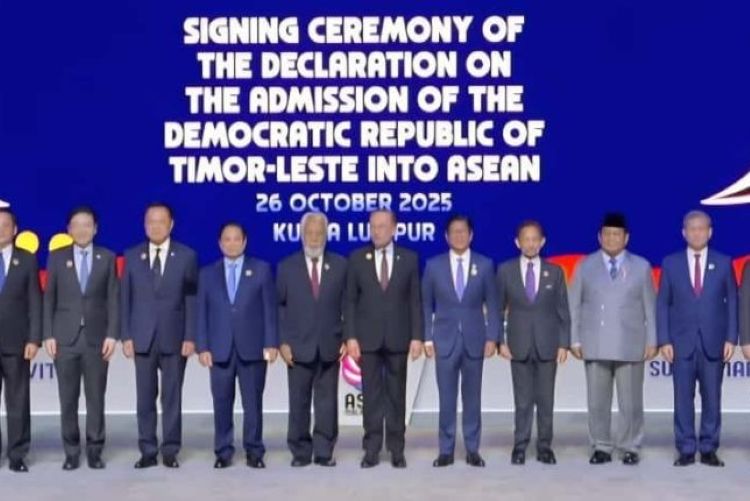
Timor-Leste’s accession to the Association of South East Asian Nations (ASEAN) ends more than twelve years of waiting and inaugurates a new phase in the country’s regional engagement. The inclusion in ASEAN of its eleventh member comes at a time of heightened geopolitical and economic pressures for the regional bloc as it navigates internal tensions and uncertainty in the Indo-Pacific.
Membership offers Asia’s youngest country access to new political and economic opportunities, but also exposes it to the same regional challenges that dominate ASEAN’s agenda. These include tensions in the South China Sea, great-power rivalry, climate risks and transnational crime.
While it has championed democracy and freedom, Timor Leste also faces structural challenges including inequality and unemployment. In the next few years, the country needs to work strategically on the following three points.
Timor-Leste ASEAN membership a geopolitical test
Timor-Leste is the only state in South East Asia categorised as “free” by the Freedom House Index, and has maintained a score of 72/100 on the aggregate of political rights and civil liberties since 2021. This is a stark difference to Indonesia, Malaysia, and the Philippines, its much larger and older democratic neighbours who have far lower scores and are deemed only “partially free”.
A study notes that leaders such as Timor Leste Prime Minister Xanana Gusmão and President José Ramos-Horta are known for their outspoken and independent traits that may stand out in an ASEAN setting where consensus is the main aim of discussions. Although their outspokenness could spark hopes for a more democratic region, this difference is also a reason for Timor-Leste to tread carefully while it navigates ASEANs varied political landscape.
Several of the bloc’s current members are currently facing challenges in their democratic functioning.
The 2024 presidential election in Indonesia became controversial when a Constitutional Court decision, accused of being politically motivated, altered age criteria to allow President Joko Widodo’s son to run for vice-president.
Malaysia’s democracy faced a significant setback with the collapse of the reformist Pakatan Harapan (PH) government in February 2020, just 22 months after its historic election victory.
The Philippines is also dealing with systemic corruption and the dominance of powerful political dynasties at national and local levels that undermine true democratic competition and accountability.
Navigating the Indo-Pacific
ASEAN member states have divergent positions towards responses to regional developments and crisis situations. Their diverse foreign policies place ASEAN states into three main categories: those who are ‘concerned’, those who prefer maintaining ‘neutrality’, and the ‘clearly aligned’. This makes a unified position very unlikely in times of tensions.
Against this backdrop, Timor-Leste must quickly strategise how it wishes to navigate its complex environment. On the one hand, it must show solidarity with its neighbours. On the other, China’s much stronger presence in Timor-Leste may compel it to think of optimal hedging strategies.
Timor-Leste’s concern in the Indo-Pacific is not as pronounced as its neighbours. While larger countries like Indonesia and the Philippines view the Indo-Pacific as a theatre of political-security prowess among nations, Timor-Leste is mainly focused on the development aspect of this ‘imaginary political region’ and the potential economic advantages that it brings for it as an individual actor.
It does not yet have a strong enough military presence for it to be considered as a threat and is therefore mostly viewed as a ‘partner’ to great powers in the region. While this situation may not be worrying today, a lack of solidarity with ASEAN will increasingly make Timor-Leste a potential ally to any competing great power and sharpen the divide among ASEAN member states.
Infrastructure to host 2029 ASEAN Summit
In an interview, President Ramos-Horta expressed Timor-Leste’s commitment to hosting its first ASEAN Summit by 2029. This commitment will be one that will either make or break Timor-Leste as it navigates the region’s most critical issues while maintaining capable leadership.
The Summit is an expensive event to hold with year-round activities, carefully thought-through logistics for events taking place across the country, and security. Indonesia is reported to have budgeted 95.24 billion rupiah or USD 6.1 million for the summits it held in 2023. Malaysia budgeted 12 million ringgit or USD 2.1 million for the 46th ASEAN Inter-Parliamentary Assembly General Assembly this year.
The Philippines is preparing a whopping 17.495 billion peso or USD 302 million budget for the summits and related meetings to be held in 2026. These numbers are a telling sign of how much ASEAN states are prepared to invest in leading delicate decision-making processes in the region while projecting national capabilities.
Beyond concerns of budget, Timor-Leste will need to quickly increase its staffing numbers ahead of 2029 across all sectors particularly in the ASEAN Political-Security Community (APSC) and ASEAN Economic Community (AEC). To ensure a successful chairmanship, it will rely heavily on its ability to engage in discussions meaningfully through capacity and bureaucratic efficiency.
Chairmanship is not only about hosting discussions. It is fundamentally about implementing regional commitments.
While Timor-Leste can take pride in the success of one of its big foreign policy goals, these critical priorities need early strategizing. The time for Timor-Leste to prepare is now, and more critically in 2028 when it becomes a part of the ASEAN Troika with the incumbent and former Chairs of ASEAN.
Yulida Nuraini Santoso is the Managing Director of the ASEAN Studies Centre and a lecturer in International Relations at Universitas Gadjah Mada, Yogyakarta, Indonesia. Originally published under Creative Commons by 360info .
.
